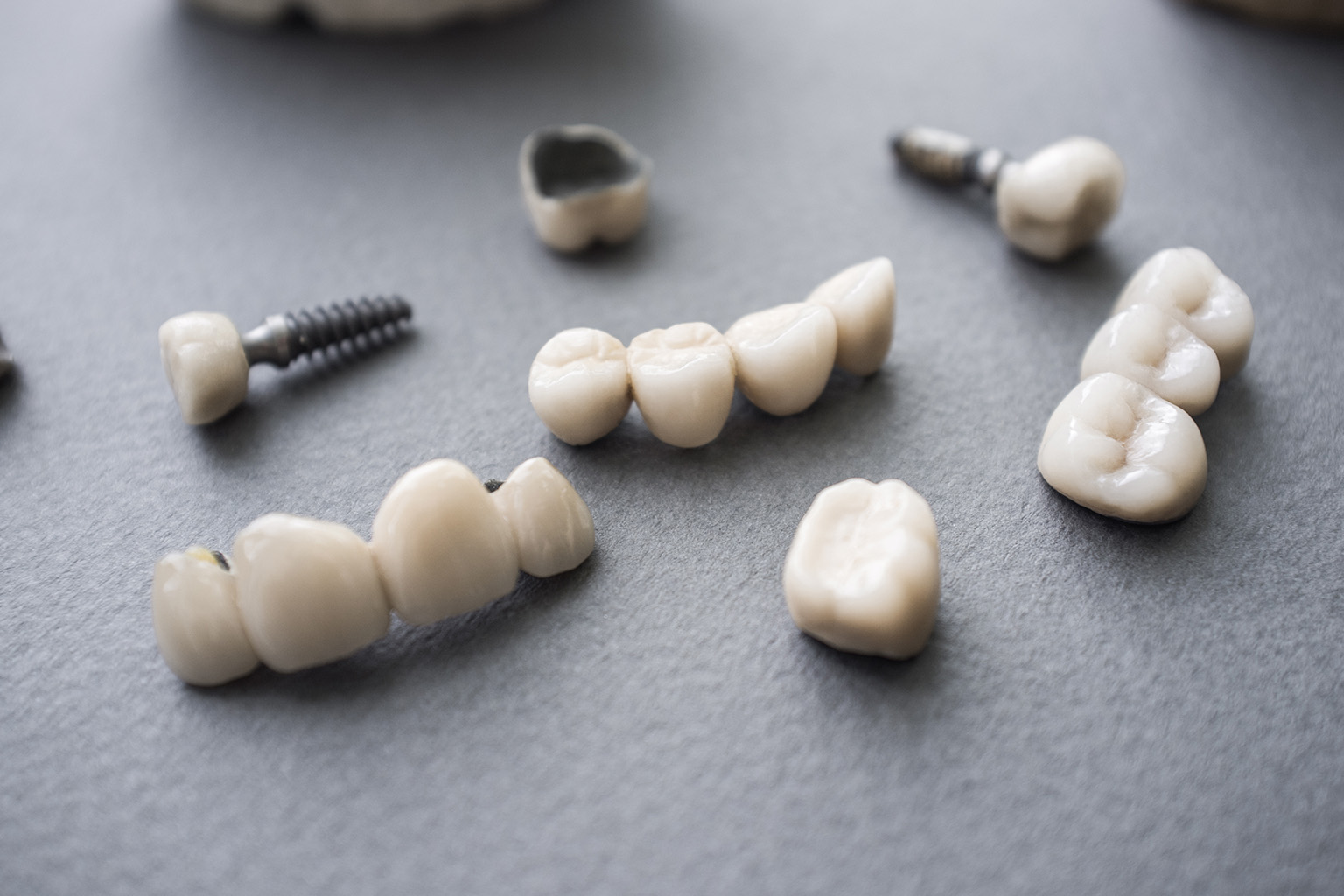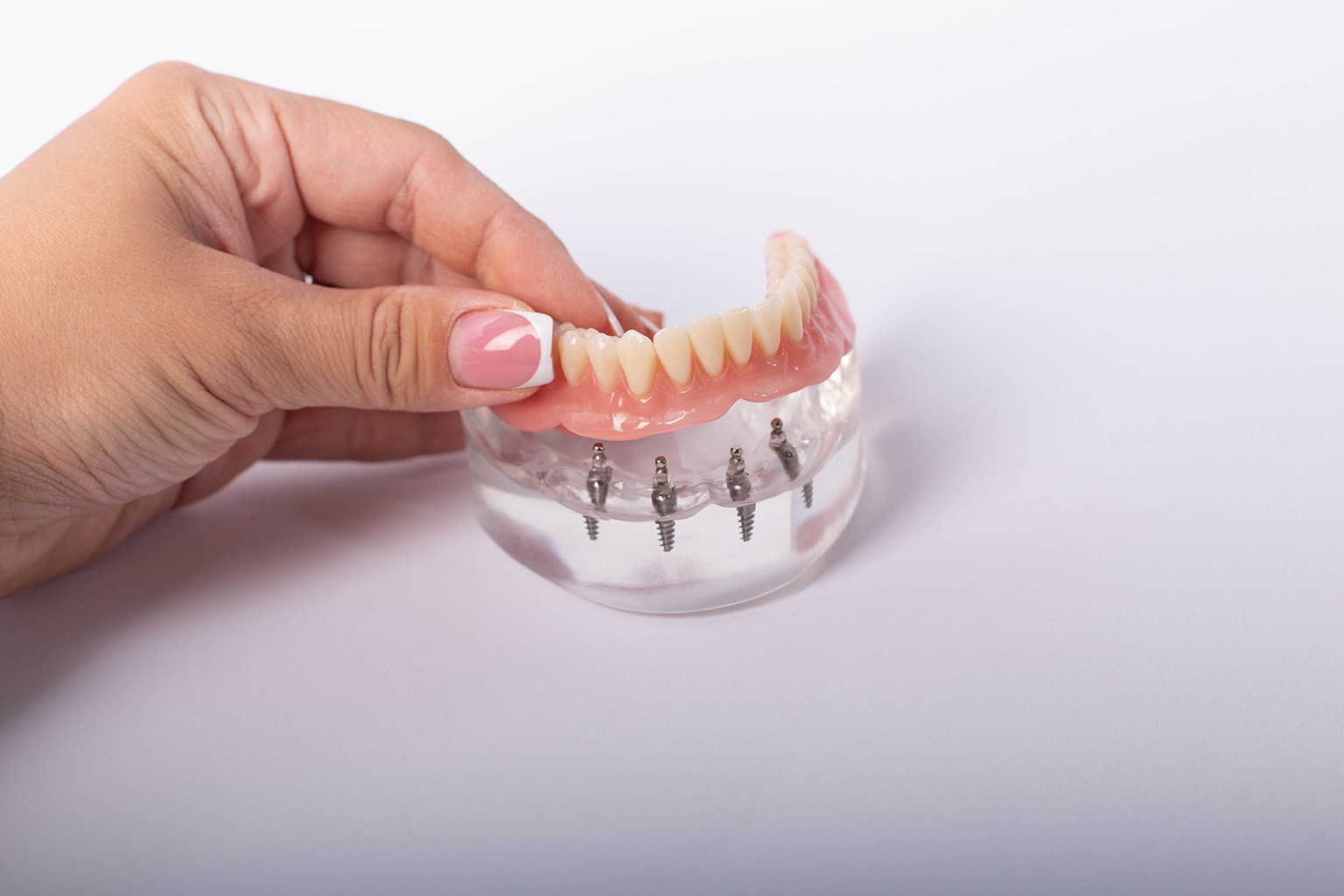A dental implant, often known as a tooth implant, is a prosthetic that replaces a lost tooth. It is a surgical element that connects to the skull or jawbone to support a denture, crown, or bridge, among other dental prostheses.
A dental implant’s construction normally comprises of three basic components:
- Implant: A tiny screw-like post that is surgically inserted into the mandible, the implant is often composed of titanium. It acts as a stand-in for the tooth root, giving the prosthetic tooth stability and support.
- Abutment: This connecting element sticks out over the gum line and is attached to the implant. It offers a foundation on which to place the artificial tooth or teeth.
- Prosthesis: The implant’s visible component, known as the prosthesis, may be a denture, bridge, or crown. It restores both appearance and functionality because it is created in order to mimic the color, shape, and size of natural teeth.
 Multiple Stages of Getting a Dental Implant
Multiple Stages of Getting a Dental Implant
- Evaluation and Planning: If a patient is a good candidate for dental implants, a dentist or oral surgeon will do a comprehensive evaluation. To plan the implant operation, X-rays, CT scans, and impressions of the jaw and teeth are obtained.
- Surgery: Inserting the dental implant into the mandible is the surgical procedure. To reduce discomfort, local anesthetic is used during this procedure. In certain situations, bone grafting may be required to guarantee that there is sufficient bone to sustain the implant.
- Osseointegration: This is the process by which the jawbone progressively develops around the implant following implantation. As a result of this integration, the implant and bone form a strong relationship that gives the replacement tooth a solid base.
- Abutment Placement: An implant is fitted with a small connector known as an abutment once it has fused with the jawbone. This acts as the prosthesis’s anchor.
- Prosthesis Placement: The dental implant procedure is finished when a specially designed crown, bridge, or denture is fastened to the abutment. The prosthesis is made to resemble a real tooth or set of teeth in both appearance and functionality.
Compared to more conventional tooth replacement solutions like dentures or bridges, dental implants provide a number of advantages. They give a better long-term solution, encourage bone growth to support the health of the jawbone, and have functionality and stability comparable to those of real teeth.
But not everybody is a good fit for dental implants. A number of factors, including general health, jawbone density, and dental hygiene practices, are important in assessing appropriateness. It’s crucial to speak with a dentist to assess unique situations and choose the finest tooth replacement solution.
Dental implants, which provide a dependable and long-lasting replacement for lost teeth, have completely changed the world of dentistry. Nonetheless, people thinking about this treatment frequently have concerns about the procedure’s specifics and expense. We will explore the most affordable solutions, comprehend the costs associated with full-mouth dental implants, and address any concerns you may have regarding the surgery, including anesthetic, in this extensive guide to dental implants.
 The Cheapest Tooth Implant: Exploring Affordable Options
The Cheapest Tooth Implant: Exploring Affordable Options
The ultimate cost of dental implants is determined by a number of factors. The total cost is influenced by the kind of implant, the material used, the location, and the dentist’s level of experience.
Among the several varieties, micro dental implants are frequently thought to be a more cost-effective choice. Because these implants are smaller than typical implants, less invasive surgery may be necessary, which could lower the cost. However, each case is different, and the dentist’s recommendation is final.
The implant’s substance is another element that affects price. Because titanium implants are strong and harmonious with the body, they are frequently utilized. But in other circumstances, some alternatives—like zirconia implants—might be more cost-effective.
Depending on the previously stated parameters, the cost of a single tooth implant could be several hundred to several thousand dollars. While locating the least expensive implant is a factor, in order to guarantee satisfactory and long-lasting outcomes, quality and the dental professional’s experience must be given top priority.
 Full Mouth Dental Implants: Understanding the Expenses
Full Mouth Dental Implants: Understanding the Expenses
For those who are missing every tooth in their jaw, whole mouth dental implants—also referred to as full arch implants or implant-supported dentures—offer a comprehensive alternative. Full mouth dental implants can range widely in price depending on a number of factors, including:
- Number of Implants: The total cost of a full mouth restoration is influenced by the number of implants needed. For stability and support, additional implants may be needed in some circumstances.
- Materials and Techniques: The cost of full mouth implants can be affected by the materials and procedures chosen. Compared to using individual implants for each tooth, All-on-4 or All-on-6 procedures may be more affordable since they require fewer implants to support an entire arch.
- Additional Procedures: In order to guarantee the effectiveness of the implants, certain patients may require extra surgeries such as sinus lifts or bone grafting. These processes may raise the final cost.
It’s important to weigh the long-term advantages and enhanced quality of life that these implants provide.
 Anesthesia and Dental Implants: Understanding Sedation Options
Anesthesia and Dental Implants: Understanding Sedation Options
Those who are thinking about getting dental implants frequently worry about the pain or anxiety involved with the process. The intricacy of the treatment and the patient’s preferences determine how much anesthetic or sedation is needed during dental implant surgery.
Local anesthetic is usually used during dental implant procedures to numb the precise area where the implants will be inserted. This guarantees the patient has no pain during the surgical procedure. Some patients may require conscious sedation or general anesthesia, particularly for more involved procedures or those who are very anxious.
- Conscious Sedation: In this type of sedation, a patient is given medicine to help them relax while they are still conscious. During the process, it lessens discomfort and anxiety.
- General Anesthesia: Patients may have general anesthesia, which renders them totally unconscious, in exceptional circumstances or throughout lengthy procedures. Usually, a hospital setting is used for this.
The patient’s medical history, degree of anxiety, and the intricacy of the operation will all be taken into account by the dental team while discussing anesthesia choices prior to the treatment.
 In conclusion…
In conclusion…
When it comes to both aesthetic and practical advantages, dental implants are a fantastic option for people who are losing teeth. When choosing dental implant procedures, quality and expertise should come first, even though cost is an important factor. Making educated judgments on their dental health is made possible by having a thorough understanding of the range of options available, including the most economical options and anesthesia techniques.
To get the best potential outcome for dental implant operations, it is best to speak with a knowledgeable dental practitioner to select the most appropriate treatment strategy.
Transform your smile with Encino Dental Studios! Schedule your appointment today for expert dental care and personalized treatments. Achieve a healthier, brighter smile with our dedicated team. This is where your path to ideal dental health starts!








